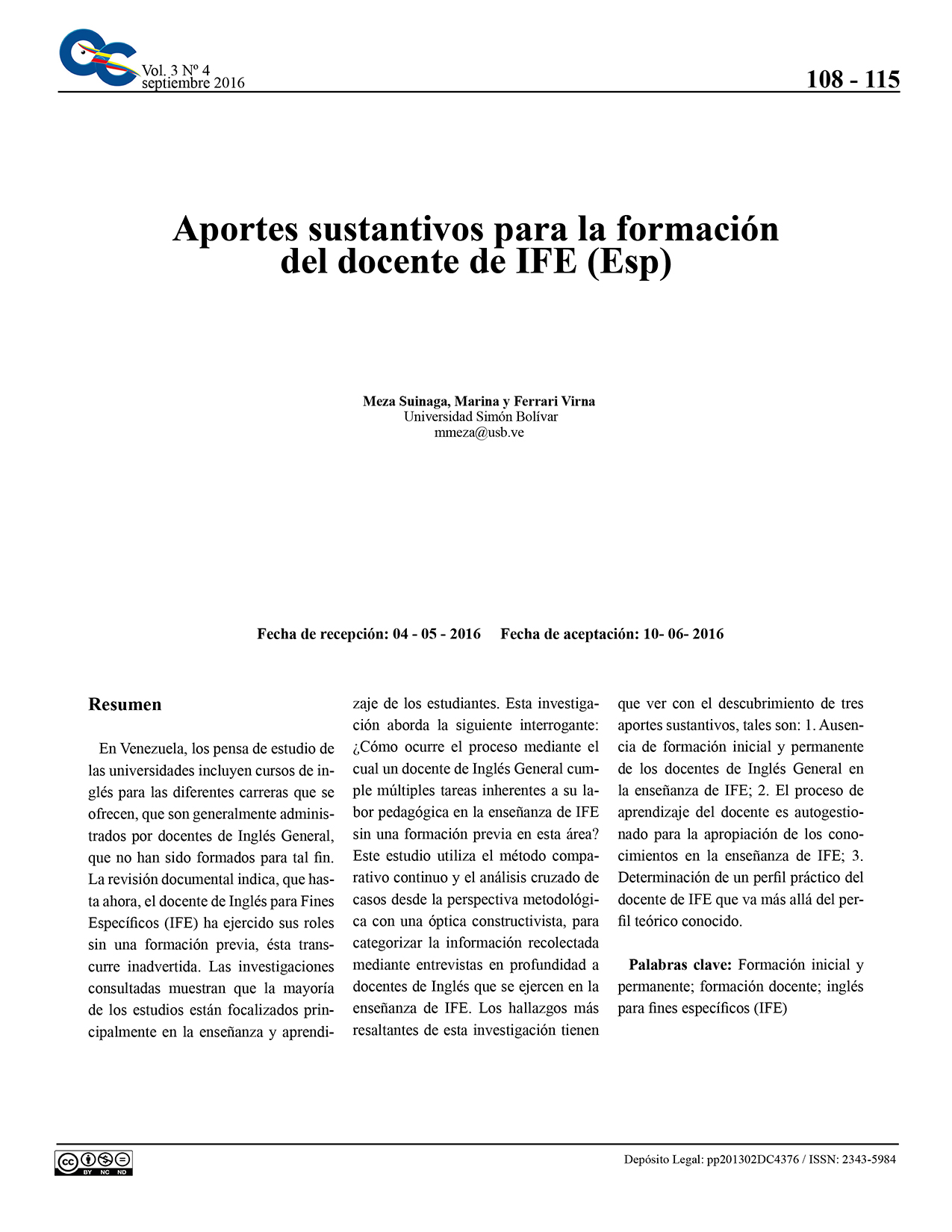Substantive contributions for the training of the IFE teacher
Keywords:
Initial and permanent training, teacher training, English for specific purposes (IFE)Abstract
In Venezuela, the study plans of the universities include English courses for the different careers offered, which are usually administered by General English teachers, who have not been trained for this purpose. The documentary review indicates that until now, the teacher of English for Specific Purposes (IFE) has exercised their roles without prior training, this goes unnoticed. The researches consulted show that most of the studies are focused mainly on the teaching and learning of the students. This research addresses the following question: How does the process by which a General English teacher perform multiple tasks inherent to their pedagogical work in teaching IFE without prior training in this area?This study uses the continuous comparative method and the cross-analysis of cases from the methodological perspective with a constructivist perspective, to categorize the information collected through in-depth interviews with English teachers who practice in the teaching of IFE. The most outstanding findings of this investigation have to do with the discovery of three substantive contributions, such as: 1. Absence of initial and permanent training of General English teachers in the teaching of IFE; 2. The learning process of the teacher is self-managed for the appropriation of knowledge in the teaching of IFE; 3. Determination of a practical profile of the teacher of IFE that goes beyond the known theoretical profile.
Downloads
References
Kachru, B y C. Nelson. (2001). World Englishes, en A. Burns y C. Coffin. Analyzing
English in a global context. A Reader. pp. 9-25. London. Routledge.
Flowerdrew, J. y M. Peacock. (2001). Issues in EAP. A preliminary perspective. En J.Flowerdrew, y M. Peacock. (Eds.) Research perspectives for English for Academic Purposes. pp. 8- 24. Cambridge. Cambridge University Press.
Fishman, J.A. (2002). El nuevo orden lingüístico. UOC Digit. HVM revista digital d’humanitats. Disponible en http://www.uoc. edu/humfil/articles/esp/fishman/fishman_imp.html
De Lotbnière, M. (2001). Global English: The European lessons.
Guardian Unlimited Archive. Disponible en: http://www. guardian.co.uk
Sedilhofer, B. (2001). Closing a conceptual map: the case for a description of English as a lingua franca.
International Journal of Applied Linguistics, 11 (2). pp. 133-158.
Yano, Y. (2001). World Englishes in 2000 and beyond. World Englishes 20 (2). pp. 119-131.
Cantón Rodríguez, M.L. (2002). La organización de un viaje como tarea didáctica final en francés turístico, en E. Hernández y L. Sierra. (Eds.) Lenguas para Fines Específicos (VIII).
Investigación y Enseñanza. pp. 293-29 Hyland, K. (2002). Teaching and researching writing. Harlow.
Longman. Saorín Iborra, A. (2003). Las cartas de queja en el aula de inglés para turismo:
Implicaciones pedagógicas basadas en el uso de recursos de cortesía. Tesis doctoral no publicada, Universitat Jaume I, Castellón. España.
Alcaraz Varó, E.. (2000). El Inglés Profesional y Académico. Madrid. Alianza Editorial.
Hutchinson, T. y Waters, A. (1987) English for Specific Purposes: A Learning-Centred Approach. Cambridge: Cambridge University Press.
Robinson, P. (1991). ESP (English for Specific Purpose). Pergamon Press Ltd. Orr, T. (1995). Studying the professions we serve. ESP News 4 (2), 11.
Dudley-Evans, T. y St John, M. (1998). Developments in English for Specific Purposes: A multi-disciplinary approach.
Cambridge University Press. Asher, R.E. y J.M, Simpson. (Eds.). (1994). The encyclopedia of
language and linguistics. Vols. 3 y 4. Oxford: Pergamon Press. Fortanet Gómez, I., Posteguillo Gómez, S. y Palmer Silveira, J.C. (2001). Teaching pragmatics in ESP: An example based on hedging. En V. Codina
Espurz y E. Alcón Soler (Eds.), Language learning in the foreign language classroom (pp. 13-24). Universitat Jaume I. Broca, A. y M, Escobar. (2002). Fundamentos para la elaboración del programa de inglés en turismo. En E. Hernández Longas y L. Sierra Ayala (Eds), Lenguas para fines específicos
(VII). Investigación y enseñanza (pp. 207-216). Alcalá de Henares: Universidad de Alcalá de Henares.
Pérez Serrano, G. (1999). Investigación cualitativa. Retos e interrogantes. I Métodos. Madrid: La Muralla, S.A. Guba, E. (1991). The alternative paradigm dialog en The Paradigm Dialog. Newbury Part. California. Sage.
Glaser, B y A. Strauss. (1967). The discovery of grounded theory strategies for qualitative research .Chicago. Aldine Pub. Co. Strauss, A. y Corbin, J. (2002). Bases de la investigación cualitativa.
Técnicas y Procedimientos para desarrollar la teoría fundamentada. Colombia: Universidad de
Antioquia.
Taylor, S. D. y Bogdan, R. (1996). Introducción a los métodos cualitativos de investigación. 3era reimpresión.
Barcelona. Paidós. Alonso, L.E. (2003). La mirada cualitativa en sociología. 2A edición. Madrid: Fundamentos.

Downloads
Published
How to Cite
Issue
Section
License

This work is licensed under a Creative Commons Attribution-NoDerivatives 4.0 International License.







